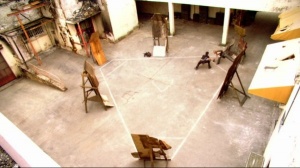Pyramid (RDM)
More actions
- For the article on the card game in the Original Series, see Pyramid (TOS).

Pyramid[1] is a popular professional-league sport watched throughout the Twelve Colonies of Kobol (Miniseries) and is also popular aboard Colonial warships (Litmus). Teams include the Caprica Buccaneers and Picon Panthers; its players, such as Sue-Shaun and Samuel Anders, are considered sports heroes.
Rules and Regulations
Playing Regulations
Pyramid is a close quarters ball game played on a pyramid-shaped court, hence the name of the game. The objective is apparently to score points by getting the ball into a goal at the top of the pyramid. Pyramid can be played one-on-one or in teams.
Players can take no more than "three paces" without passing, shooting, or rebounding the ball off of one of the walls. The outlined areas in the corners and the center of the arena are "neutral zones". When a player places the ball in these zones, other players must back off and may not make contact.[2]
Full contact is allowed (when the ball is not in a neutral zone), and once a player has been tackled, they must pass the ball. How this is handled in one-on-one games is left unspecified. The game is won by the team with the most points at the end. However, under what circumstances the games ends is also left unspecified.[3]
There are versions of pyramid for one, three or five players from each team on the court at once.[4] The play area is consistently refered to as an "arena" and the corner with the goal as the "head". Apparently each team starts out in one of the corners besides the head and then vie for control of the ball. The initial ball placement is not defined, but a face-off is mentioned tangentially later in the article with no details.
Court and Team Sizes
While teams can consist of upwards of eight people, it is probable that the sport is played with players rotating on and off the court between plays.
The pyramid court where Kara Thrace and Samuel Anders first play (regulation-size in spite of its makeshift layout) is not much large than a tether-ball circle. While unlikely to support up to 16 players at once, three players per side are a probable arrangement. Non-professional play (high school and collegate, for instance) may have fewer players than the professional teams, indicating a skill factor needed to play with a large number of athletes.
Equipment
The ball is cantaloupe-sized, between the sizes of a softball and soccer ball. The ball's size, combined with the cupped structure of the goal mean that outside (towards the side-lines) shots are quite a bit more difficult than inside (towards the center of the arena) shots. However, the more inside a player gets, the more likely the defensive play. This defensiveness is why pyramid is so physical: battling over the good shooting space directly in front of the goal.
Notes
- In the Original Series, pyramid referred to the poker-like card game often played by the Viper pilots. This became "triad" in the Re-imagined Series, and the Original Series game known as triad was renamed "pyramid". This was the result of a mix-up by Ronald D. Moore, as he explains in his podcast for the episode "Kobol's Last Gleaming, Part I":
...somewhere along the line I transposed the names. I misremembered what they called it and I- the sort of racquet-ball slash basketball game that they played in the original and that we referred to in this series, I now call Pyramid, and the name of that game in the original which was Triad is now what we sort of call our poker game. So it's one of those "Oh, it's one of the charming differences between the old and the new.", it's either that or it's just a stupid error that the writer made.
See Also
- Triad (TOS), the corresponding ball game in the Original Series
- Pyramid (TOS), a card game with the same name in the Original Series
- Triad (RDM), a card game in the Re-imagined Series
References
- ↑ The game was derived by the Re-imagined Series writers from the triad games played in the Original Series, viewed as a cross between basketball, rugby and lacrosse.
- ↑ This may be a rule somewhat like the NCAA's old "halo" rule on the declaration of a fair catch of a kick off in American football.
- ↑ Perhaps, like basketball, a pick-up game could be played to a certain number of points, while professional (or otherwise more official) games have a clock or other timer.
- ↑ Battlestar Galactica: The Official Magazine, issue 1, pp. 28-29
